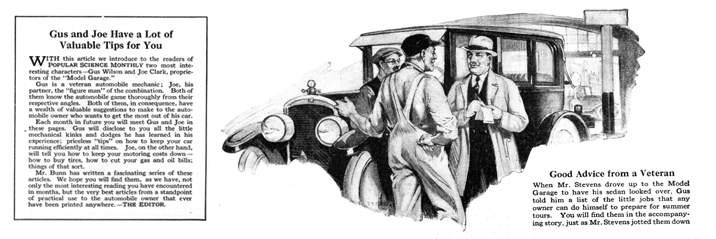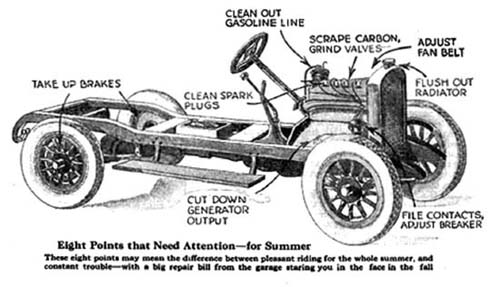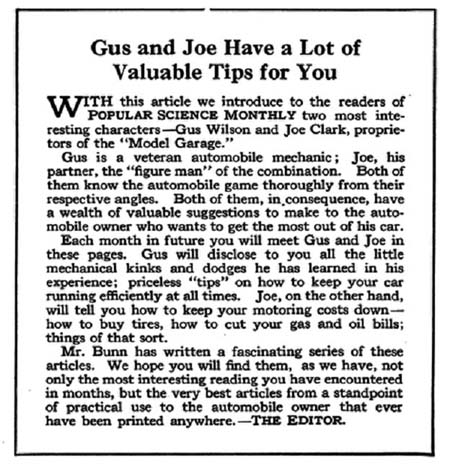July 1925 - December 1970
Gus Wilson's Model Garage
Alphabetical List of Stories Monthly Illustration Galleries Index Links-All Stories
July 1925 - The Series Begins
IS YOUR CAR IN SUMMER TRIM?
by Martin Bunn
A fascinating New Series of Stories
in Which Two Veteran Auto Men tell You
How to Save Worry and Expense.

Early summer is the busy season for the automobile repairman. With cars to overhaul, valves to grind, ignition systems to be readjusted, and a thousand and one other jobs to be done for motorists who are preparing for a summer of touring, the average garage is likely to find itself snowed under, and Wilson & Clark's Garage was no exception.
"Seems as though every one who ever owned a car wants something done," complained Gus Wilson wearily, as he got out the creeper preparatory to sliding under another car to examine the brake rods.
Wilson was the mechanic of the firm, a gray-haired veteran of the automobile repair shop, who had been working on automobiles since the days when they were called "horseless carriages."
"The more the merrier, Gus," grinned Joe Clark cheerfully, as he picked a time slip from the steering-wheel of the car on which his partner had just finished working.
Clark was the "figure man," of the combination, an expert bookkeeper who did all the pencil work for the firm. He was happiest when a rush of work that meant sleepless nights for his partner permitted him to make many entries in his books and many deposits in the bank.
A fine sedan rolled in from the street. Clark's grin widened as he observed -- another car over which his tired partner would grumble while performing the best repair job of which he was capable.
"Good morning, Mr. Stevens," he greeted the driver of the car as the latter threw open the door and stepped out. "What's the trouble this morning?"
"Not a thing," responded the other. "Nothing that I know of, anyway. But I'm going on a long tour next week, and I thought, if Wilson wasn't busy, it might be well to have him look the car over, and see if there's anything that needs attention."
"Good idea, Mr. Stevens," nodded Clark. "A lot of our customers would save themselves trouble and money if they got in the habit of doing that. Hey, Gus!" he called to his invisible partner. "Take a look at Mr. Stevens' car, won't you?"
Wilson was muttering to himself as he emerged from beneath the automobile on which he was working. His grumbling ceased, though, and a smile replaced his frown as he glanced toward Stevens' car, shining in the morning sunlight, spic and span as a battleship, its motor purring quietly -- obviously a car in which the owner took great pride; a car that had not been abused.
"Humph, doesn't look as though there could be much wrong with that," observed Wilson. "What seems to be the trouble with her?"
Stevens repeated what he had previously told Clark, and Wilson, nodding his approbation, stepped into the driver's seat, followed by the owner.
He pushed down the throttle a couple of times, meanwhile listening intently to the response of the motor, then backed the car out and drove over his usual test route, which included a near-by hill. They were back in the garage in a few minutes.
"Not a blessed thing wrong with her -- now," said Gus, as he followed Mr. Stevens out of the car.
"Why 'now'?" asked the owner anxiously. "Is anything likely to -- "
"Oh, no," Wilson told him; "but there are a lot of things you ought to do before you start on a long tour. If you have a piece of paper, you might jot them down. You can attend to them just as easily as I can."
"Why, I thought you garage fellows were always against an owner tinkering with his car!" exclaimed Stevens in surprise.
"Tinkering, yes," said Wilson; "just turning nuts and taking things apart without any idea of what you're doing. But things would be a lot easier for everybody -- owner and mechanic -- if owners would learn to do the little jobs themselves."
"For instance, while we were riding along, you may have heard a little rattle in front. Your license plate is loose. It will take you only a second to get a wrench and screwdriver and tighten it. And, when you have your wrench and screwdriver handy, why not go over the car from stem to stern and try every single nut and screw? If any are loose, tighten them. On a new car like yours the parts set, sort of, after you've driven it awhile, and sometimes half a turn on a nut will keep it tight and save you a big repair bill."
"From the looks of your car and what I know about you, it's safe for me to assume that you're keeping the car oiled and greased properly. But there are quite a lot a little things that a man like you, who's about to make a long trip, ought to do before he starts. Ready with the pencil?"
"Summer touring, especially through hilly country in a car full of passengers and baggage, is likely to bring out the defects in the cooling system. Better flush out your radiator to remove the dirt and rust. The easiest way to do it is to run your motor just a little bit faster than the usual idling speed and run water into the radiator filling cup from a hose while the drain cock at the bottom of the radiator is open. When the water begins to run fairly clean, you can consider the job finished."
"When I shut off your ignition just now, I noticed that the fan turned over a few times after the motor had stopped. You'd better take up the play in the fan belt. Make it just tight enough so that you can turn the fan by hand and not too easily. When you're running against the wind, plenty of air passes through your radiator to your motor. In fact, if you always could run against the wind, you wouldn't need a fan at all. Running with the wind, though, you're absolutely dependent upon your fan to suck in air and cool the motor, and, if the belt is loose, there won't be any air sucked in. If the day is hot, your motor will boil sure as shooting, particularly if you have to make many traffic stops."
"Your ignition system is working fine now, but it would be a good idea to clean all your spark plugs -- just on general principles. Don't forget, either, to put a couple of spare plugs in your toolkit before you start. Also, you might clean the breaker contacts in the timer -- file them square -- and reset them according to the thickness gage in your toolkit. If you don't do this, they may get pitted badly enough to make the motor miss and make starting difficult."
"That will be about all for the ignition," went on Wilson after pausing to permit the other to catch up in his notes. "Of course, you'll make sure that all wires are tight? Now, let's see what ought to be done about the gas line."
He "tickled" the carburetor, and noted the time it took for that gasoline to overflow.
"Humph," he commented. "I thought so. Remember that the car slowed down just a little near the top of that hill we climbed? Your gasoline pipe is clogged up just enough to cut down the supply a little when the throttle is wide open. Better clean it out, or it will get worse and worse until your motor may not run at all. And while you're about it, you might as well clean out the little filter in the top of the vacuum tank. In fact, you'd be much better off if you had two filters -- one between the main tank and the vacuum tank, and the other between the main tank and the vacuum tank and the carburetor. If you don't want to tackle the job of installing them yourself -- "
"No, I'll let you do it for me," interrupted the other. "But I don't see why two filters are necessary. Why isn't one enough?"
"Well," said the garage man, "every now and then the gasoline flows from the main tank into the vacuum tank with a rush -- not in a steady, slow stream as it does from the vacuum tank into the carburetor. When this happens, the movement of the gas is so fast that there isn't time for the tiny particles of dirt to be filtered out. They won't pass through your second filter, though. Also, a second filter in the gas line will remove the larger particles that otherwise would clog the valves in the vacuum tank."
"That sounds reasonable," admitted Stevens. "I'll run the car in about Thursday, and let you put the filter in. How about taking up the brakes?"
"Won't do any harm," said Wilson. "They hold now, but they may not after a few hundred miles more of driving."
"And how about removing carbon and grinding the valves?" asked Stevens.
"Well, those jobs really aren't necessary just now," said Wilson. "Still, if you think this is the only chance you'll have to lay up the car for a day or two, you'd better have them done. And we might adjust the generator at the same time. Just now it's pushing too much current through the battery. It's all right to have 15 amperes going into the battery during the winter when you don't use the car so much and must use plenty of juice every morning when you start the motor. In the summer, though, when the motor starts on the first turn and you're taking long trips and consequently charging the battery almost constantly, it's advisable to cut the charging rate down to six or seven amperes. You'd be astonished to know how many batteries are ruined by too much charging."
"That's something I never thought about," said Stevens.
"It's just another one of the little points about a car that are neglected by the average owner until they lead to serious trouble and a big repair bill."
Stevens smiled. "I've found out that it pays," he said.
"You bet it pays," agreed Wilson. "All those little things that you're jotting down in your note book pay a car-owner in real money. And lest you forget anything in your hurry to get away you'd better put these down as things that must be attended to before you start:"
"Add water to the storage battery. Grease everything in sight. Pump up the tires -- including the spare -- to the proper pressure. Drain the crankcase and fill it with new oil. See that the radiator is filled with clean water and the gasoline tank filled with gas. Put a couple of spare light bulbs under the seat. And, of course, make sure that all of your tools are in the car."
"With the few little things I'm going to do for you, I'm willing to bet you that, unless you get a puncture, you won't have to do a single thing to this car all summer -- except drive it!" boasted the capable garage man.
END
L. Osborne 2019

